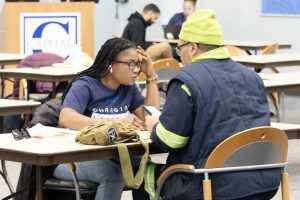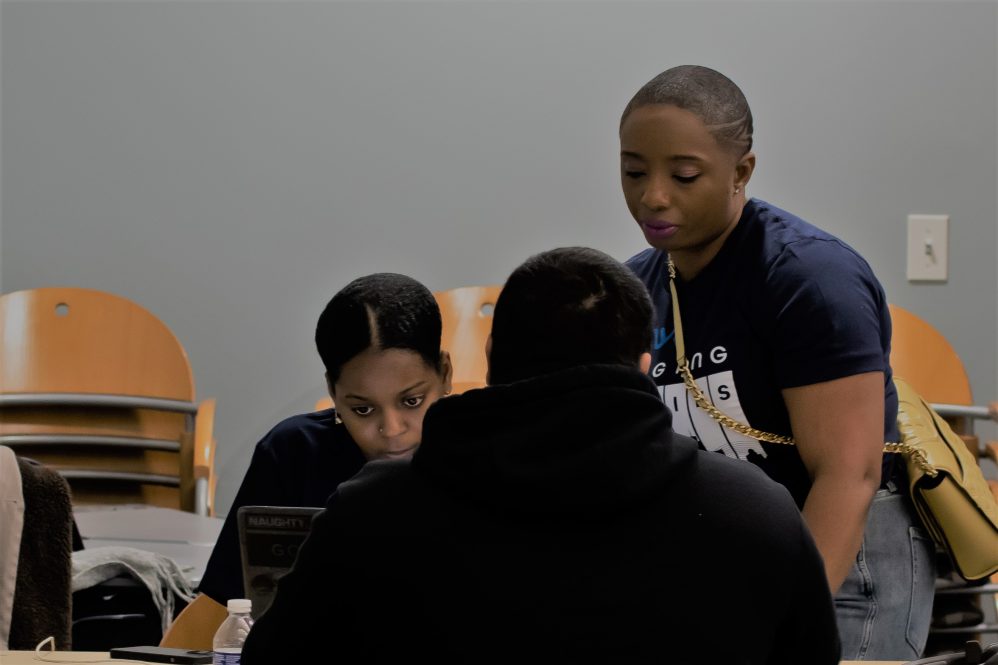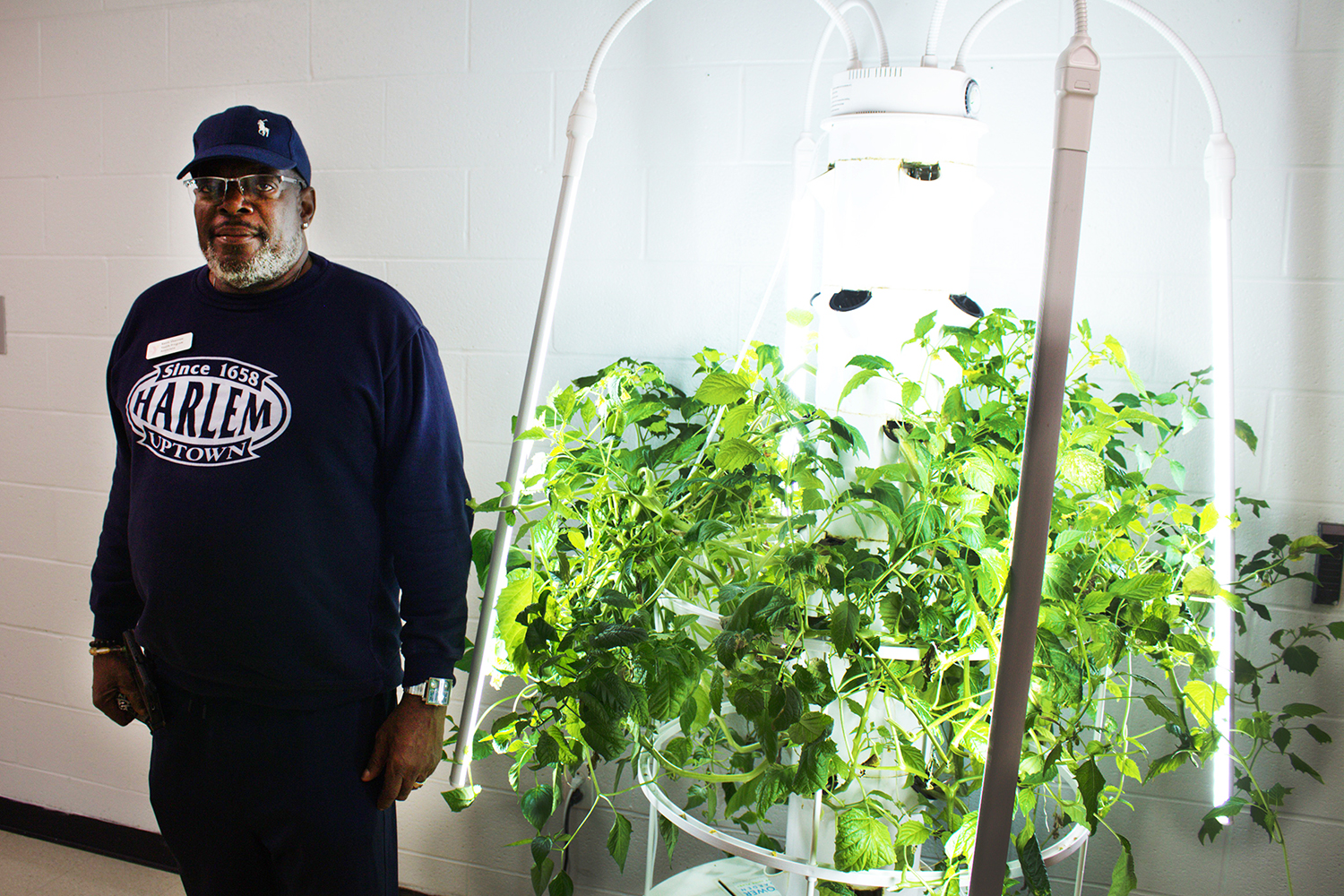Devon Kempson didn’t expect a second chance. He figured people with his background are lucky to get a first opportunity, never mind a second.
In the most disadvantaged parts of Hartford, people get labeled early on, he says. Maybe being overly active in school becomes a behavioral problem. As children get older, the labels are applied with less mercy until the judgements define them. Yet Kempson has received mercy in a major way, in the form of an absolute pardon, which he called a second chance at life.
In August, Kempson attended the first expungement clinic organized by Tiana Hercules ’08 JD ’08 MBA and co-sponsored by UConn Law. Eleven students from the School volunteered for a second clinic on Saturday, Feb. 25.
“It felt liberating. When you’re down and out, you count yourself out,” he says. “You have so many people tell you you’re done, you’re finished. I can’t say that they owed [a pardon] to me, but it was mercy. I’m grateful for that. This clinic was everything for me.”
When Kempson first heard about the possibility of a pardon, he thought, “How dare you ask for a pardon?” He had been convicted of first-degree robbery and served eight and a half years in prison, followed by three years of parole.
But Kempson wanted his last name, the name he gave his children, to be associated with something positive. With a criminal record, he had limited job opportunities, couldn’t vote, and was ineligible for certain kinds of housing. With a pardon, he felt he had a second chance at life.
At the clinic, a volunteer took his information, helped him put together his narrative for the application, and gave him a checklist of documentation to gather. Hercules represented him, as she does anyone who comes to the clinic, and at the hearing in February he was granted a pardon.
Kempson was present at the second clinic on Feb. 25 at Capital Community College in Hartford, where UConn Law students helped do the work that got him started on the process in August. He wants to be an example, to demonstrate to others that they deserve another chance as well.

Hercules, who received both her law and business degrees from UConn in 2008, has worked as a criminal defense attorney and has seen the collateral consequences that comes with a criminal record. As an advocate for change in her Hartford community, she wanted to bring the process of legal representation full circle.
Hercules, a member of the Hartford City Council, hopes to continue to host expungement clinics through her company, Lady Jane, every six months, helping those who are eligible for pardons navigate the process.
“Folks do a lot to overcome their criminal record, so they should be granted a second opportunity at life,” she says. “In a city like Hartford and the urban communities in Connecticut, we cannot afford to not have every productive and skilled person in our community not working to their full potential. Now, those doors can become open to them.”
Hercules says the Connecticut Board of Pardons and Paroles grants pardons at a rate of more than 90%. The hardest part is getting through the application process to the hearing.
UConn Law students have helped with that work at both clinics held to date. They sat down with people seeking a pardon and explained the process. They took what data had been collected already, helped with narrative statements, started the online application, and explained the next steps, handing over a checklist the pardon-seekers could follow.
“I feel our criminal system should be more rehabilitation-focused than punishment-focused,” says William Roberts ’25 JD. “This is a perfect example of people getting their lives together.”
Hercules remembers seeking out opportunities to get involved in the community while at UConn Law, and believes this work gives students practical experience interviewing clients, knowledge of the pardons system, and perspective on how their skills and expertise can be leveraged to benefit a community in need.
“For me, it’s personal,” LLM student Tresha-Gaye Ustanny says. “I have relatives that have criminal records. Having a system by which people can have a path to a full future, to be able to participate in a full legal life is important. When I saw the opportunity, I just jumped at it. I’m not even into criminal law, but this I believe in.”
Isioma Osakwe is an LLM student from Nigeria studying human rights law and social justice at UConn Law. “It’s great for UConn to have this cause,” she says. “I believe this is also exposing me to what is in the U.S. and it’s something we can bring and recommend. Something simplified like this is worthy of emulating.”
Professor Rachel Reeves, Director of Field Placement and Pro Bono Programs, was also present at both clinics. “UConn Law students have a deep commitment to service and community partnership events like the ones hosted by Attorney Hercules provide wonderful opportunities for students to both contribute and learn,” she says. “By volunteering, students develop an awareness of the legal issues facing individuals in the community, gain knowledge and skills that will help them be of service – as law students and future lawyers – and have the opportunity to see first-hand the positive impact of their work.”



